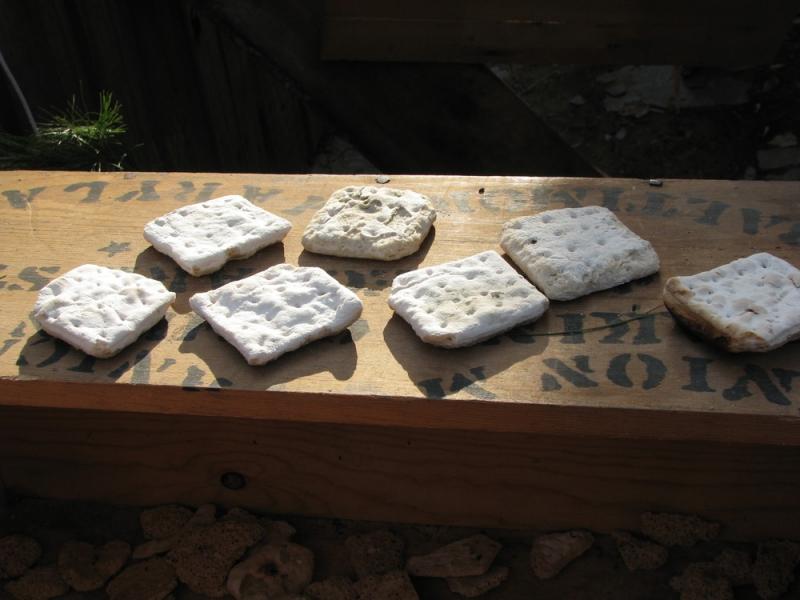Hardtack
Hardtack, a dry flour biscuit, earned nicknames such as "tooth-dullers," "worm castles," and "sheet iron crackers" from soldiers. Hardtack made up a large portion of a soldier’s daily ration. Factories in the North baked hundreds of hardtack crackers every day, packed them in wooden crates and shipped them out by wagon or rail. If the hardtack was received soon after leaving the factory, it could be tasty and satisfying. Usually, the hardtack did not get to the soldiers until months after it had been made. By that time, they were too hard to be eaten without first being soaked in water or coffee. Sometimes they were infested with small bugs the soldiers called weevils.
Hardtack could be eaten plain though most men preferred to toast them over a fire, crumble them into soups, or crumble and fry them with their pork and bacon fat in a dish called skillygalee.

The soldiers' rations of hardtack. 2011. Photograph. National Parks Service.https://www.nps.gov/media/photo/gallery-item.htm?id=2F4A5AE3-1DD8-B71C-07F4B90CDE67F47F&gid=2F1E048C-1DD8-B71C-07DE0FCDFFC7AEB0
Public Domain
Public Domain is a copyright term that is often used when talking about copyright for creative works. Under U.S. copyright law, individual items that are in the public domain are items that are no longer protected by copyright law. This means that you do not need to request permission to re-use, re-publish or even change a copy of the item. Items enter the public domain under U.S. copyright law for a number of reasons: the original copyright may have expired; the item was created by the U.S. Federal Government or other governmental entity that views the things it creates as in the public domain; the work was never protected by copyright for some other reason related to how it was produced (for example, it was a speech that wasn't written down or recorded); or the work doesn't have enough originality to make it eligible for copyright protection.
Add a comment
PLEASE NOTE: NCpedia provides the comments feature as a way for viewers to engage with the resources. Comments are not published until reviewed by NCpedia editors at the State Library of NC, and the editors reserve the right to not publish any comment submitted that is considered inappropriate for this resource. NCpedia will not publish personal contact information in comments, questions, or responses. If you would like a reply by email, note that some email servers, such as public school accounts, are blocked from accepting messages from outside email servers or domains. If you prefer not to leave an email address, check back at your NCpedia comment for a reply. Please allow one business day for replies from NCpedia. Complete guidelines are available at https://ncpedia.org/about.